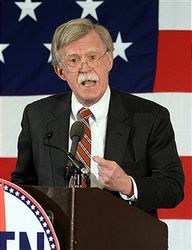 本日未明に発足したトランプ政権で国務副長官に目されている、米国元国連大使のジョン・ボルトン氏が1月17日付の米紙「ウォールストリート・ジャーナル」に寄稿、「海洋の自由を守り、一方的な領土併合を防ぐことは米国の核心的利益だ」と強調しつつ「米軍の台湾駐留によって東アジアの軍事力を強化できる」と述べ、在沖縄米軍の台湾への一部移転を提案したという。
本日未明に発足したトランプ政権で国務副長官に目されている、米国元国連大使のジョン・ボルトン氏が1月17日付の米紙「ウォールストリート・ジャーナル」に寄稿、「海洋の自由を守り、一方的な領土併合を防ぐことは米国の核心的利益だ」と強調しつつ「米軍の台湾駐留によって東アジアの軍事力を強化できる」と述べ、在沖縄米軍の台湾への一部移転を提案したという。
ボルトン氏は、日本の国連常任理事国入りを支持し、また台湾の国連加盟も支持する親日・親台湾派と言われ、トランプ政権のキーパーソンで副大統領に就任するマイク・ペンス氏と同様に「ネオコン」(ネオコンサバティズムの略称、新保守主義)の代表的な人物とされているタカ派。
このボルトン氏の提案に、評論家の宮崎正弘(みやざき・まさひろ)氏は「北朝鮮問題でも強硬姿勢を示してきたうえ、日本の拉致家族が訪米したときも、まっさきに会見した」ことを伝えつつ「このボルトン論文は、次期政権の対中政策のスタンスがにじみ出ているのではないか」(1月19日発行「宮崎正弘の国際ニュース・早読み」)と、トランプ政権の対中政策とリンクさせて評している。
また、国際政治学者の藤井厳喜(ふじい・げんき)氏は「夕刊フジ」へのコメントで「中国に対する極めて強い抑止力になる」と支持している。下記にその記事と「ウォールストリート・ジャーナル」紙に掲載されたボルトン氏の論文を紹介したい。
米軍台湾駐留が急浮上、元米国連大使が提言 識者「中国牽制にトランプ氏の『強烈な反撃』かも」
【夕刊フジ:2017年1月19日】
ドナルド・トランプ次期米大統領が、かつてない「対中強硬策」を選択する可能性が出てきた。次期政権での国務副長官起用が取り沙汰されるジョン・ボルトン元米国連大使が17日付のウォールストリート・ジャーナル紙に寄稿し、「米軍の台湾駐留によって東アジアの軍事力を強化できる」と述べ、在沖縄米軍の台湾への一部移転を提案したのだ。「台湾統一」を目指す中国の習近平国家主席と、真正面から激突するのか。
ボルトン氏は「台湾は地政学的に東アジアの国に近く、沖縄やグアムよりも南シナ海に近い」と指摘。軍事的覇権を強める中国への牽制(けんせい)に加え、沖縄米軍の一部を台湾に移すことで「日米摩擦を起こしている基地問題をめぐる緊張を和らげる可能性がある」と述べた。
また、「海洋の自由を守り、一方的な領土併合を防ぐことは米国の核心的利益だ」と強調。台湾との軍事協力の深化は「重要なステップだ」とした。
トランプ氏は、台湾の蔡英文総統との電話会談に踏み切ったうえ、中国が「核心的利益」と位置付ける台湾問題で、「1つの中国」政策を見直す考えを示している。
ボルトン氏の寄稿をどうみるべきか。
国際政治学者の藤井厳喜氏は「東アジア情勢にとって大変良い発信だ。もともと、在沖縄米軍は朝鮮半島情勢への対応と同時に、台湾防衛の意味も持っていた。中国は、トランプ氏が『1つの中国』に疑義を示したことに反発し、空母『遼寧』を台湾周辺に派遣して牽制した。これに対する、トランプ氏の『強烈な反撃』かもしれない。ボルトン氏は現在民間人だが、トランプ政権に近い人物であり、中国に対する極めて強い抑止力になる」と語った。
OPINION COMMENTARY
Revisit the ‘One-China Policy’
A closer U.S. military relationship with Taiwan would help counter Beijing’s belligerence.
By JOHN BOLTON
Jan. 16, 2017 7:07 p.m. ET
The People’s Republic of China sent its aircraft carrier, Liaoning, through the Strait of Taiwan early this month, at least in part responding to Taiwanese President Tsai Ing- wen’s phone conversation congratulating President-elect Donald Trump.
That’s Beijing’s style: Make an unacceptable long-distance phone call, and an aircraft carrier shows up in your backyard. It is akin to proclaiming the South China Sea a Chinese province and constructing islands in international waters to house military bases; to declaring a provocative Air Defense Identification Zone in the East China Sea; and to seizing Singaporean military equipment recently transiting Hong Kong for annual military exercises on Taiwan.
It is high time to revisit the “one-China policy” and decide what America thinks it means, 45 years after the Shanghai Communiqué. Mr. Trump has said the policy is negotiable. Negotiation should not mean Washington gives and Beijing takes. We need strategically coherent priorities reflecting not 1972 but 2017, encompassing more than trade and monetary policy, and specifically including Taiwan. Let’s see how an increasingly belligerent China responds.
Constantly chanting “one-China policy” is a favorite Beijing negotiating tactic: Pick a benign-sounding slogan; persuade foreign interlocutors to accept it; and then redefine it to Beijing’s satisfaction, dragging the unwary foreigners along for the ride. To Beijing, “one China” means the PRC is the sole legitimate “China,” as sloganized in “the three no’s”: no Taiwanese independence; no two Chinas; no one China, one Taiwan. For too long, America has unthinkingly succumbed to this wordplay.
Even in the Shanghai Communiqué, however, Washington merely “acknowledges” that “all Chinese” believe “there is but one China,” of which Taiwan is part. Taiwanese public opinion surveys for decades have shown fewer and fewer citizens describing themselves as “Chinese.” Who allowed them to change their minds? Washington has always said reunification had to come peacefully and by mutual agreement. Mutual agreement hasn’t come in 67 years, and won’t in any foreseeable future, especially given China’s increasingly brutal reinterpretation of another slogan—“one country, two systems” in Hong Kong.
Beijing and its acolytes expected that Taiwan would simply collapse. It hasn’t. Chiang Kai-shek’s 1949 retreat was not a temporary respite before final surrender. Neither the Shanghai Communiqué nor Jimmy Carter’s 1978 derecognition of the Republic of China persuaded Taiwan to go gentle into that good night—especially after Congress enacted the Taiwan Relations Act of 1979.
Eventually Taiwan even became a democracy, with the 1996 popular election of Lee Teng-hui, the peaceful, democratic transfer of power to the opposition party in 2000, and further peaceful transfers in 2008 and 2016. So inconsiderate of those free-thinking Taiwanese.
What should the United States do now? In addition to a diplomatic ladder of escalation, we can take concrete steps helpful to U.S. interests. Here is one prompted by China’s recent impoundment of Singapore’s military equipment. Spoiler alert: Beijing will not approve.
America could enhance its East Asia military posture by increasing U.S. military sales to Taiwan and by again stationing military personnel and assets there, probably negotiating favorable financial terms. We need not approximate Douglas MacArthur’s image of Taiwan as an “unsinkable aircraft carrier,” or renegotiate a mutual defense treaty. Basing rights and related activity do not imply a full defense alliance. Our activities would not be dissimilar to Singapore’s, although they could be more extensive. The Taiwan Relations Act is expansive enough to encompass such a relationship, so new legislative authority is unnecessary.
Some may object that a U.S. military presence would violate the Shanghai Communiqué, but the language of the Taiwan Relations Act should take precedence. Circumstances in the region are fundamentally different from 1972, as Beijing would be the first to proclaim. Nearby Asian governments would cite the enormous increase in Chinese military power and belligerence. Most important, effectively permanent changes in the Taiwan-China relationship have occurred, making much of the communiqué obsolete. The doctrine of rebus sic stantibus—things thus standing—justifies taking a different perspective than in 1972.
Taiwan’s geographic location is closer to East Asia’s mainland and the South China Sea than either Okinawa or Guam, giving U.S. forces greater flexibility for rapid deployment throughout the region should the need arise. Washington might also help ease tensions with Tokyo by redeploying at least some U.S. forces from Okinawa, a festering problem in the U.S.-Japan relationship. And the current leadership of the Philippines offers little chance of increasing military and other cooperation there in the foreseeable future.
Guaranteeing freedom of the seas, deterring military adventurism, and preventing unilateral territorial annexations are core American interests in East and Southeast Asia. Today, as opposed to 1972, a closer military relationship with Taiwan would be a significant step toward achieving these objectives. If China disagrees, by all means let’s talk.
Mr. Bolton is a senior fellow at the American Enterprise Institute and author of “Surrender Is Not an Option: Defending America at the United Nations and Abroad” (Simon & Schuster, 2007).

